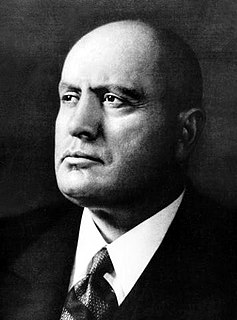 W
WBenito Amilcare Andrea Mussolini was an Italian politician and journalist who founded and led the National Fascist Party. He was Prime Minister of Italy from the Fascist coup d'état in 1922 to his deposition in 1943, and Duce ("Leader") of Italian Fascism from the establishment of the Italian Fasces of Combat in 1919 to his execution in 1945 during the Italian Civil War. As dictator of Italy and founder of the fascist movement, Mussolini inspired other totalitarian rulers such as Adolf Hitler, Francisco Franco, and António de Oliveira Salazar.
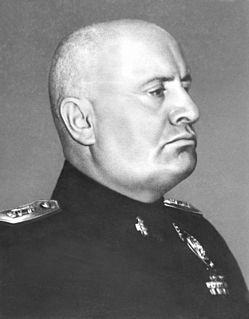 W
WThe Mussolini Cabinet was the longest-serving government in the history of united Italy. The Fascist dictator ruled the country from 31 October 1922 to 25 July 1943 for a total of 7572 days, or 20 years, 8 months and 25 days.
 W
WGiacomo Acerbo, Baron of Aterno was an Italian economist and Fascist politician who drafted the Acerbo Law which solidified Benito Mussolini's position once in power.
 W
WEdoardo Alfieri was an Italian fascist politician and diplomat.
 W
WItalo Balbo was an Italian fascist politician and Blackshirts' leader who served as Italy's Marshal of the Air Force, Governor-General of Libya and Commander-in-Chief of Italian North Africa. Balbo was described as the "heir apparent" to Italian dictator Benito Mussolini, often seen as one of his most probable successors.
 W
WAntonio Stefano Benni was an Italian fascist who served as President of the General Confederation of Italian Industry from 1923 until 1934.
 W
WMichele Bianchi was an Italian revolutionary syndicalist leader who took a position in the Unione Italiana del Lavoro (UIL) He was among the founding members of the Fascist movement. He was widely seen as the dominant leader of the leftist, syndicalist wing of the National Fascist Party. He took an active role in the "interventionist left" where he "espoused an alliance between nationalism and syndicalism." He was one of the most influential politicians of the regime before his succumbing to tuberculosis in 1930. He was also one of the grand architects behind the "Great List" which secured the parliamentary majority in favor of the fascists.
 W
WCarlo Alberto Biggini was an Italian fascist politician who served as Minister of Education before and after proclamation of the Italian Social Republic under Benito Mussolini.
 W
WGiuseppe Bottai was an Italian journalist, and member of the National Fascist Party of Benito Mussolini.
 W
WTullio Cianetti was an Italian fascist politician who was well known for his work with the trade unions.
 W
WCostanzo Ciano, 1st Count of Cortellazzo and Buccari was an Italian naval officer and politician. He was the father of Galeazzo Ciano.
 W
WGian Galeazzo Ciano, 2nd Count of Cortellazzo and Buccari was an Italian diplomat and politician who served as Foreign Minister in the government of his father-in-law, Benito Mussolini, from 1936 until 1943.
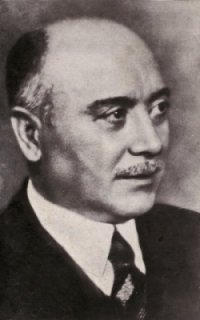 W
WOrso Mario Corbino was an Italian physicist and politician. He served as the minister for education in 1921 and as the minister for economy in 1921. He also served as professor in Messina (1905) and in Rome (1908). He is noted for his studies of the influence of external magnetic fields on the motion of electrons in metals and he discovered the Corbino effect. Corbino worked with Damiano Macaluso where they discovered the Macaluso-Corbino effect, a strong magneto-rotation of the plane of polarization observed at wavelengths close to an absorption line of the material through which the light is travelling. As director of the Institute of physics he was the supervisor of Enrico Fermi, Edoardo Amaldi, Franco Rasetti and Emilio Segrè, Bruno Pontecorvo, Oscar D'Agostino, Ettore Majorana.
 W
WEmilio De Bono was an Italian General, fascist activist, Marshal, and member of the Fascist Grand Council. De Bono fought in the Italo-Turkish War, World War I, and the Second Italo-Abyssinian War.
 W
WAlberto de' Stefani was an Italian politician and economist. Coming from a background in liberalism to Benito Mussolini's fascism, De Stefani was in charge of Italian economics from 1922 to 1925. His time in charge was characterized by laissez-faire ideals.
 W
WCesare Maria De Vecchi, 1st Conte di Val Cismon was an Italian soldier, colonial administrator and Fascist politician.
 W
WArmando Diaz, 1st Duke of the Victory, was an Italian general and a Marshal of Italy. He is mostly known for his role as Chief of Staff of the Regio Esercito during World War I from November 1917. He managed to stop the Austro-Hungarian advance along the Piave River in the First Battle of Monte Grappa. In June 1918, he led the Italian forces to a major victory at the Second Battle of the Piave River. A few months later, he achieved a decisive victory in the Battle of Vittorio Veneto, which ended the war on the Italian Front. He is celebrated as one of the greatest generals of the war.
 W
WLuigi Federzoni was a twentieth-century Italian nationalist and later Fascist politician.
 W
WPietro Gazzera was an officer in the Italian Royal Army during World War II, as well as a prewar Italian politician.
 W
WGiovanni Gentile was an Italian neo-Hegelian idealist philosopher, educator, and fascist politician. The self-styled "philosopher of Fascism", he was influential in providing an intellectual foundation for Italian Fascism, and ghostwrote part of The Doctrine of Fascism (1932) with Benito Mussolini. He was involved in the resurgence of Hegelian idealism in Italian philosophy and also devised his own system of thought, which he called "actual idealism" or "actualism", which has been described as "the subjective extreme of the idealist tradition".
 W
WGiuseppe Cobolli Gigli was an Italian politician, member of Benito Mussolini's fascist government from 1935 to 1939 as minister of Public Works.
 W
WGiovanni Giuriati was an Italian fascist politician.
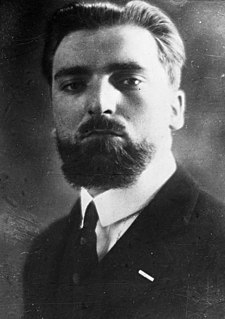 W
WDino Grandi, 1st Conte di Mordano, was an Italian Fascist politician, minister of justice, minister of foreign affairs and president of parliament.
 W
WGiovanni Host-Venturi, also known as "Nino" Host-Venturi was an Italian fascist politician and historian.
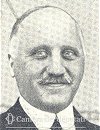 W
WGuido Jung was a successful Jewish-born Italian banker and merchant from Sicily, who later converted to Catholicism.
 W
WAlessandro Pavolini was an Italian politician, journalist, and essayist, notable for his involvement in the Fascist government, during World War II, and also for his cruelty against the opponents of fascism.
 W
WRenato Ricci was an Italian fascist politician active during the government of Benito Mussolini.
 W
WAlfredo Rocco was an Italian politician and jurist. He was Professor of Commercial Law at the University of Urbino (1899–1902) and in Macerata (1902–1905), then Professor of Civil Procedure in Parma, of Business Law in Padua, and later of Economic Legislation at La Sapienza University of Rome, of which he was rector from 1932 to 1935.
 W
WEdmondo Rossoni was a revolutionary syndicalist leader and an Italian fascist politician who became involved in the Fascist syndicate movement during Benito Mussolini's regime.
 W
WАdelchi Serena was an Italian government official and Fascist politician. He was Party Secretary of the National Fascist Party from October 1940 until December 1941.
 W
WAttilio Teruzzi was an Italian soldier, colonial administrator, and Fascist politician.
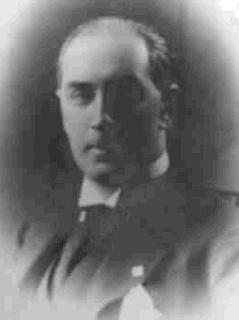 W
WPaolo Ignazio Maria Thaon di Revel was an Italian politician and fencer. He was the son of Count Vittorio Thaon di Revel and Elfrida Maria Atkinson. He fought in the First World War. He was also Mayor of Torino (1929–35) and Italian Minister of Finance (1935–43) in the Mussolini Cabinet. After the war, he was president of the organising committee of the 1956 Winter Olympics at Cortina d'Ampezzo.
 W
WGiuseppe Volpi, 1st Count of Misurata was an Italian businessman and politician.